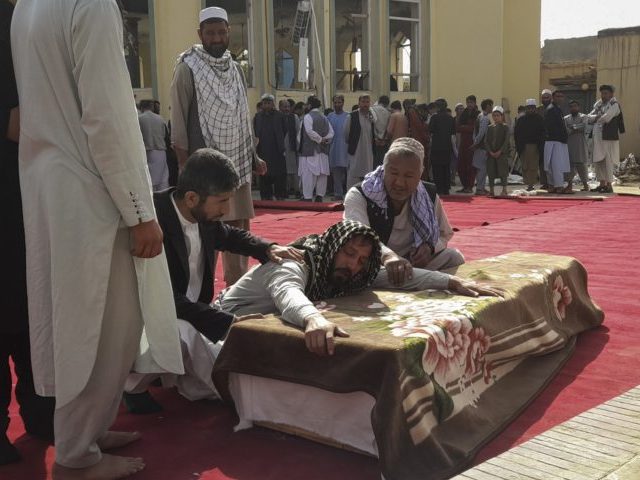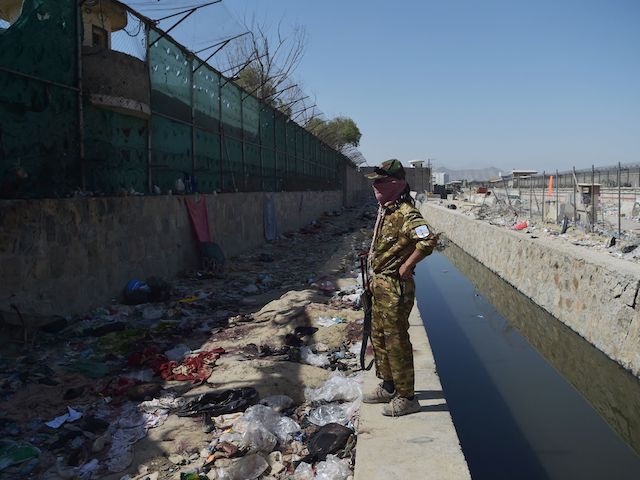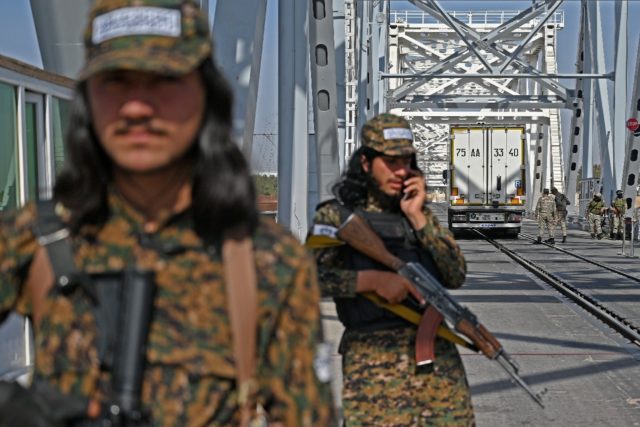A Taliban spokesman confirmed a major attack on a military hospital in Kabul on Tuesday, blaming the Islamic State on the same day a colleague told reporters the jihadist organization “does not exist” in Afghanistan.
Both the Taliban and the Islamic State’s Afghanistan wing, ISIS-K, are Sunni jihadist terrorist organizations. The Taliban seized power in Afghanistan on August 15, following President Joe Biden’s announcement that he would extend the U.S. war there in April. Taliban jihadists have clashed with ISIS-K for years, largely over control of opium-producing territory. The Taliban has attempted to argue that it is capable of suppressing the ISIS threat in Afghanistan while blaming the group for a growing list of terrorist attacks since August, most prominently the suicide bombing of Kabul’s international airport shortly after the Taliban takeover.
Voice of America, citing an anonymous member of the Taliban, reported that Tuesday’s attack on Kabul’s flagship military hospital had resulted in 15 deaths and several others injured. Taliban spokesman Zabihullah Mujahid issued an official declaration through his Twitter account that claimed only five deaths and asserted the Taliban had successfully thwarted the attack in 15 minutes.
حمله داعشیها بر شفاخانه ۴۰۰ بستر ناکام شد. ۵ تن داعشی از بین رفتندhttps://t.co/BHYqbxoYgt pic.twitter.com/HZMvJDv0DD
— Zabihullah (..ذبـــــیح الله م ) (@Zabehulah_M33) November 2, 2021
“The ISIS insurgents wanted to target civilians, doctors, and patients in the hospital but, before they could reach the target, they were targeted and thrown off their feet by the Islamic Emirate’s vigilante forces,” Mujahid’s statement read. “The attack was contained within 15 minutes, with ISIS militants killed at the entrance and courtyard of the hospital.”
“No one was injured inside the hospital, but two women, one child, and two Mujahideen [Taliban terrorists] were martyred outside the hospital and four others were injured,” Mujahid announced. He asserted that no Islamic State terrorists managed to enter the hospital.
Voice of America noted that neither the Islamic State nor any other organization had claimed responsibility for the attack at press time. ISIS typically wastes little time before assuming credit for such attacks, including many that experts later believe they may not have had involvement in.

Relatives and residents attend a funeral ceremony for victims of a suicide attack at the Gozar-e-Sayed Abad Mosque in Kunduz, northern Afghanistan, October 9, 2021. The mosque was packed with Shiite Muslim worshippers when an Islamic State suicide bomber attacked during Friday prayers, killing dozens in the latest security challenge to the Taliban as they transition from insurgency to governance. (AP Photo/Abdullah Sahil)
Mujahid blamed the Islamic State for the attack shortly before the Afghan media outlet Khaama Press published an article in which another Taliban spokesman, Bilal Karimi, insisted the Islamic State had no presence in the country.
“Bilal Karimi has said that ISIS-K is just a phenomenon and does not exist at all in Afghanistan leave alone recruiting people in the country,” according to Khaama. “Spokesperson of the Taliban said that their intelligence has strictly been following the group and they are being suppressed wherever they pose a potential threat.”
Khaama asked Karimi for comment in response to a story by the Wall Street Journal alleging that anti-Taliban elements previously belonging to the fallen Afghan government have begun to either join the Islamic State or establish ties with ISIS social infrastructure in the country. The article hinted that ISIS could become a more significant threat to the Taliban and to the United States with the resources that former Afghan government intelligence agents may provide them.
“The former personnel is mostly US-trained Afghan spies who have been joining the terror group in northern Afghanistan,” Khaama reported, citing the Journal.
Taliban leaders have repeatedly vacillated on their assessment of the Islamic State since taking power in August. The terrorist organization insisted it had no reason to fear an ISIS presence in the country in the immediate aftermath of their seizure of power but blamed ISIS-K for the large-scale bombing of Kabul’s international airport in August. Reports leaked following the attack – which killed at least 169 Afghans, 13 American service members, and injured hundreds of others – that the Taliban may have stated it was aware of an ISIS threat. In October, U.S. officials confirmed that the individual who committed the suicide bombing was an inmate at a prison in Bagram Air Base, a former American facility, before Taliban jihadists freed him. Islamic State propaganda identified the man as Abdul Rehman al-Logari.

A Taliban fighter stands guard at the site of the August 26 twin suicide bombs, which killed scores of people, including 13 U.S. troops, at Kabul airport on August 27, 2021. (Wakil Kohsar/AFP via Getty Images)
Experts told Canada’s CBC in August that the Islamic State was believed to maintain as many as 2,000 members in Afghanistan.
A month later, the Biden administration executed a drone strike in Kabul against a vehicle the Pentagon claimed was “known to be an imminent ISIS-K threat.” Officials insisted that the targeted car was carrying explosives meant for a jihadist attack. In reality, the attack killed ten Afghan citizens with no known ties to the Islamic State, among them seven children.
“Mr. Zemari Ahmadi and others who were killed were innocent victims who bore no blame and were not affiliated with ISIS-K or threats to U.S. forces,” Colin Kahl, the undersecretary of defense for policy, confirmed in October. Ahmadi was an Afghan aid worker.
The Taliban began more vocally claiming that the Islamic State had no presence in Afghanistan in early October. Mujahid, the top spokesman, announced that month that a “very decisive and successful” attack had eliminated the Islamic State’s entire Kabul cell.

COMMENTS
Please let us know if you're having issues with commenting.